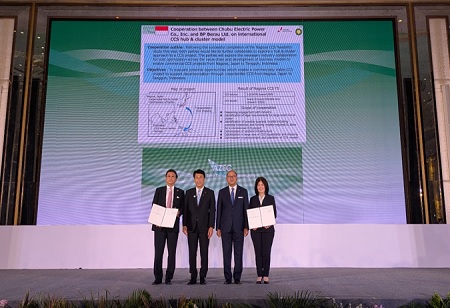
BP Berau and Chubu Expand Cooperation on Global CCS Hub and Cluster Study

 After completing the Nagoya CCS feasibility study this year, BP Berau and Chubu Electric Power Co have strengthened their partnership to investigate a CCS value chain extending from the Port of Nagoya in Japan to the Tangguh field in Teluk Bintuni, Papua Barat, Indonesia.
After completing the Nagoya CCS feasibility study this year, BP Berau and Chubu Electric Power Co have strengthened their partnership to investigate a CCS value chain extending from the Port of Nagoya in Japan to the Tangguh field in Teluk Bintuni, Papua Barat, Indonesia.
The enhanced partnership is outlined in an amended memorandum of understanding (MoU) signed today by BP, the operator of the Tangguh Production Sharing Contract (PSC), and Chubu Electric. This revised MoU expands upon the original agreement from September 2023, now including an evaluation of cost optimization across the CCS value chain and business models to facilitate commercial CCS projects from Nagoya, Japan, to Tangguh, Indonesia.
Kathy Wu, bp regional president Asia Pacific, gas and low carbon energy and Hiroki Sato, Division CEO of global business at Chubu Electric, signed the MoU amendment on the second day of Asia Zero Emission Community (AZEC) Ministerial Meeting today at The St. Regis Jakarta.
Kathy Wu commented, "The MoU amendment marks the continuation of an impactful collaboration between Chubu and bp, together with our Tangguh partners. As the community engages at AZEC and finds a way to support Asia's net zero agenda, this collaboration showcases our part of the works in progressing decarbonization in the Asia region".
Hiroki Sato commented, "I believe CCUS is one of the essential pieces for the journey of decarbonization. There is no doubt bp is a very reliable partner for Chubu. Taking the opportunity of this memorable event, I wish to proceed our Nagoya Port CCUS project with the support by the Government of Indonesia and Japan".
The expanded MoU will now also address the identification of legal requirements for a large-scale hub and cluster, potential business models, and the necessary incentives and funding mechanisms for a commercial CCS project. Additionally, it will cover the optimization of onshore infrastructure, large-scale CO2 liquefaction and shipping, as well as the procurement and operation of CO2 vessels. BP and Chubu Electric are targeting net-zero CO2 emissions from their operations by 2050. The Port of Nagoya, Japan's largest port by cargo volume, is responsible for 3% of the country's total CO2 emissions and has committed to reducing its emissions by 46% by FY2030 compared to FY2013 levels.

